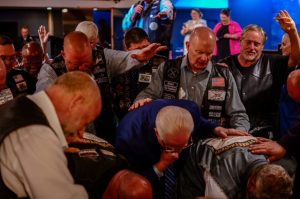We are The Apostolic Motorcycle Ministry of Jesus Christ. But what exactly does it mean to BE APOSTOLIC?
Acts 2:42 states, “And they continued steadfastly in the apostles’ doctrine and fellowship, and in breaking of bread, and in prayers.”
The first thing we see is the phrase “continued steadfastly” προσκαρτεροῦντες proskarterountes (pros-kar-ter-eh’-o) means to be earnest towards something, to persevere and be constantly diligent.
Likewise, the persona is one of — attending to someone, remaining by their side, and not leaving or forsaking them.
The expression here denotes that they earnestly continued to live out the Apostles teaching, fellowship, breaking of bread, and in prayers. and did not forsake their specific and detailed instructions.
There are Four Pillars of the Apostolic Church established in Acts 2:42:
THE APOSTLE’S DOCTRINE
One sure evidence of conversion is a desire to be instructed in the teachings (doctrines) of the Scripture and a willingness to act on the preaching of the gospel.
Simon Peter’s exegetical argument and exegesis of the Psalms and Prophets demonstrates how Jesus is superior to David, and that Jesus’ death was part of God’s plan for mankind’s salvation.
“But Peter, standing up with the eleven, lifted up his voice, and said unto them, Ye men of Judaea, and all ye that dwell at Jerusalem, be this known unto you, and hearken to my words:”
(Acts 2:14)
“And with many other words did he testify and exhort, saying, Save yourselves from this untoward generation. Then they that gladly received his word were baptized: and the same day there were added unto them about three thousand souls.” Acts 2:40-41
FELLOWSHIP
Koinonia is the Greek word translated “fellowship” in the New Testament and is an extremely important concept. It means, “sharing in common.”
Having said that is can also be translated: Participation, partnership, and sharing.
“For it hath pleased them of Macedonia and Achaia to make a certain contribution (koinōnia) for the poor saints which are at Jerusalem. It hath pleased them verily; and their debtors they are. For if the Gentiles have been made partakers of their spiritual things, their duty is also to minister unto them in carnal things.” (Romans 15:26-27)
Bradley Chance from Holman’s Bible Dictionary writes: Though it is not translated “fellowship” in English versions, Paul actually used the term koinonia to denote the financial contribution which he was collecting from Gentile believers to take to Jerusalem for the relief of the saints who lived there.
BREAKING BREAD
Food is important to God. Paul made this clear in his preaching in when he said, “Nevertheless He (God) left not himself without witness, in that he did good, and gave us rain from heaven, and fruitful seasons, filling our hearts with food and gladness. (Acts 14:17)
Breaking bread together can be the first step toward building relationships and creating community. A sign of sharing When Jesus multiplied bread to feed the crowd, bread became a sign of sharing.
A reminder of Christ’s sacrifice breaking bread together can be a reminder of Christ’s sacrifice and a time to give thanks for redemption and new life.
PRAYERS
“And in those days, when the number of the disciples was multiplied, there arose a murmuring of the Grecians against the Hebrews, because their widows were neglected in the daily ministration. Then the twelve called the multitude of the disciples unto them, and said, It is not reason that we should leave the word of God, and serve tables. Wherefore, brethren, look ye out among you seven men of honest report, full of the Holy Ghost and wisdom, whom we may appoint over this business. But we will give ourselves continually to prayer, and to the ministry of the word.” (ACTS 6:1-4)
Michael Green, in his highly rivered book, Evangelism in the Early Church, wrote this concerning the first century Church and prayer: “People did not merely here the Gospel: they saw it in action, and were moved to respond.”
Furthermore, Mr. Green goes on to write this about the Church today: “By far the fastest growing Christian communion in the world is the Pentecostal. They have some weaknesses, to be sure, but they expect to see God at work among them. They expect to see healing. They experience God speaking through them in prophetic clarity that is hard to decry.
And they find that when they come against spiritual forces which hold men and women in bondage, these are cast out by God’s Spirit and the result is a new liberation, indeed what the New Testament calls a new creation. It has long been fashionable for us to dismiss these gifts as unnecessary or unattainable today. We would be unwise to do so. They are part of God’s equipping of his Church for evangelism.”
Prayer should be our first response not our last resort. The first century Church was all about prayer.
“Now there were in the church that was at Antioch certain prophets and teachers; as Barnabas, and Simeon that was called Niger, and Lucius of Cyrene, and Manaen, which had been brought up with Herod the tetrarch, and Saul. As they ministered to the Lord, and fasted, the Holy Ghost said, Separate me Barnabas and Saul for the work whereunto I have called them. And when they had fasted and prayed, and laid their hands on them, they sent them away.” (ACTS 13:1-3)
Let us continue steadfastly as disciple makers in these four Apostolic pillars.
Love Like Jesus – Preach Like Paul – Ride Like Jehu
 We are pleased to announce a fantastic new ministry partnership with Sages Ministry. Sages is an exciting ministry that exists to provide resources and ministry outlets to those who are over the age of 55.
We are pleased to announce a fantastic new ministry partnership with Sages Ministry. Sages is an exciting ministry that exists to provide resources and ministry outlets to those who are over the age of 55.

